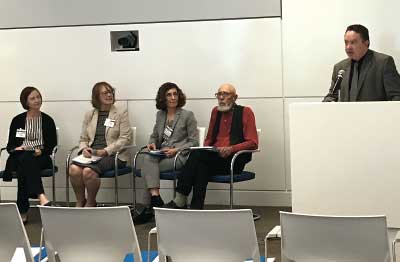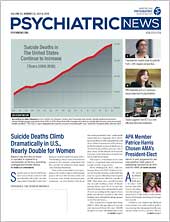Geriatric psychiatrist Stephen Bartels, M.D., thought his elderly father’s lack of energy and interest in life was normal for a man who had cancer. So when his father, an Army veteran, attempted to hang himself, Bartels was shocked. As a clinician, he felt he should have recognized that his father was severely depressed.
Bartels, the Herman O. West Professor of Geriatrics and professor of psychiatry and community and family medicine and health policy at the Dartmouth Institute, shared his experience in May at an event marking the inaugural National Older Adult Mental Health Awareness Day. The event was sponsored by the Substance Abuse and Mental Health Services Administration (SAMHSA) in conjunction with the Department of Health and Human Services Administration for Community Living (ACL) and the National Coalition on Mental Health and Aging (NCMHA).
“It is really critical that we help these proud individuals who come from a generation where they pull themselves up from their bootstraps to see that it’s OK to talk about depression and help those of us who are family members and providers to recognize that [mental health] is really complicated,” Bartels said. When an individual has multiple medical conditions and is also depressed, it can be difficult for family members and providers “to discern what is going on.”
SAMHSA hosted the event to highlight the complex behavioral health issues facing Americans aged 65 and older, a group whose number is expected to double by 2038.
The event provided an interactive forum for government officials, mental health advocates, clinicians, and organization leaders representing the fields of psychiatry and geriatric care, including Anita Everett, M.D., immediate past APA president and chief medical officer of SAMHSA. Presenters relayed the importance of partnerships among government agencies and community programs supported by SAMHSA, in addition to evidence-based, coordinated primary and general health care. Panel experts fielded questions from audience members and webcast viewers.
“Aging well includes mental health,” said Paolo del Vecchio, M.S.W., director of SAMHSA’s Center for Mental Health Services and forum moderator.
Del Vecchio shared data from SAMHSA showing that 1 in 5 adults over age 65 has a mental illness or substance use disorder. In addition, older adults account for more than 18 percent of suicide deaths. “It’s about time to put the focus on mental health and aging,” he said.
Joel Miller, M.S.Ed., director and CEO of the American Mental Health Counselors Association, noted that the number of Medicare recipients with behavioral health conditions will climb from 8 million to 15 or 16 million in the next 10 years.
“The ‘silver tsunami’ will overwhelm our health and human services systems in a way that we have not seen before,” he said. He noted that behavioral health conditions are an impediment to living well with old age. “They cause considerable personal suffering, particularly for seniors, and are exacerbated by social isolation,” he said.
Lance Robertson, assistant secretary for aging and head of the ACL, emphasized that local, state, and national networks of organizations that provide services and support to older adults, in addition to universities and nonprofit and faith-based groups, must work together to tackle mental health issues related to the expanding senior population.
For example, he said, one local senior center helped an elderly man who had bipolar disorder and substance use disorder find psychiatric treatment and achieve sobriety after 40 years of drinking.
“Through [ACL’s] partners and programs, we are able to reach professionals and volunteers who work with older adults in every community,” he said.
SAMHSA, the ACL, and the NCMHA distributed lists of resources related to older adult mental health, including information on suicide prevention. The information is posted on the organizations’ respective websites.
“Behavioral health is essential to overall health,” del Vecchio said. “Prevention works, treatment is effective, and, most importantly, people do in fact recover.” ■
Resources for older adults are posted on the following websites:
SAMHSA;
ACL; and
NCMHA.

